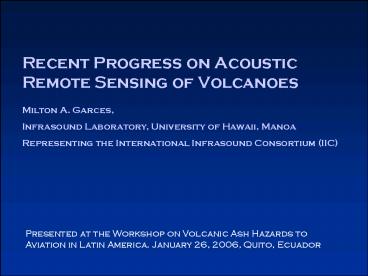Recent Progress on Acoustic Remote Sensing of Volcanoes - PowerPoint PPT Presentation
1 / 9
Title:
Recent Progress on Acoustic Remote Sensing of Volcanoes
Description:
Presented at the Workshop on Volcanic Ash Hazards to Aviation in Latin America. ... 2C broadband seismometer, Meteorological station. Real-time satellite link ... – PowerPoint PPT presentation
Number of Views:65
Avg rating:3.0/5.0
Title: Recent Progress on Acoustic Remote Sensing of Volcanoes
1
Recent Progress on Acoustic Remote Sensing of
Volcanoes
Milton A. Garces, Infrasound Laboratory,
University of Hawaii, Manoa Representing the
International Infrasound Consortium (IIC)
Presented at the Workshop on Volcanic Ash Hazards
to Aviation in Latin America. January 26, 2006,
Quito, Ecuador
2
Summary of the Workshop on Acoustic Remote
Sensing of Volcanoes
Sponsored by Geological Survey of
Canada National Science Foundation International
Association of Volcanology and Chemistry of the
Earth's Interior Instituto Geofisico, Escuela
Politécnica Nacional, Quito, Ecuador National
Center for Physical Acoustics, University of
Mississippi Infrasound Laboratory, University of
Hawaii
3
Agenda
Thirty Participants
Principles of Infrasound and Volcano
Acoustics Sensor Technology and Array Design Data
Acquisition Systems and Formats Signal
Processing Signal, Noise, and Clutter Canadian
and US Prototype Operational System ASHE French
and Australian Volcano Monitoring
Studies Science of Volcano Acoustics, and
Infrasonic Signals from Ecuador, St. Helens,
Kilauea, and Other Volcanoes. Selected
Contributions from Participants.
4
ASHE - Acoustic Surveillance for Hazardous
Eruptions
- David McCormack, Geological Survey of Canada
- Henry Bass, NCPA University of Mississippi
- Milton Garces, University of Hawaii
- Michael Hedlin, UCSD
- Hugo Yepes, Escuela Politecnica Nacional, Quito,
Ecuador
- Requests from ICAO, FAA
- Has the potential to continuously monitor
relatively cheaply over hundreds of kilometres - Is now a mature, proven technology suitable for
deployment in remote areas - Aviation community would like 5 minute warning.
There is a direct tradeoff between spacing of
arrays and latency of warning. - Natural technology for direct measurement of
atmospheric perturbation
5
ASHE - Acoustic Surveillance for Hazardous
Eruptions
4-element infrasound array, 2C broadband
seismometer, Meteorological station Real-time
satellite link
3C broadband seismometer, Meteorological
station Real-time satellite link
Real-Time Data sent to Geological Survey of
Canada
6
Monitoring of Indonesian volcanoes with
infrasound preliminary resultsSURvey of
Volcanic Arc of IndonesiaJ. Guilbert1, P.
Harjadi2, M. Purbawinata3, S. Jammes1, A. Le
Pichon1, B. Feignier1CEA/DASE
Detections obtained during the month of March 2005
Clear and continuous infrasound detections are
identified from Pinatubo, Semeru, Krakatau,
Talang and Barren Island volcanoes demonstrating
the potential of infrasound technology for
volcano monitoring
7
Multi-Technology observations of the Manam PNG
Volcano Eruption, January 2005 Potential for an
Enhanced Volcanic Ash Warning System David
Brown, Andrew Tupper, Doug Christie, Ima Itikarai
- Dec 2005
- 3 operational IMS stations,
- sending to Vienna
- 1 real time to Canberra (IS05)
- March 2006
- 3 real time to Canberra
- Automatic processing in Canberra
- detection list
- source location
2643 km
2116 km
2600 km
2600 km
2887 km
3618 km
IS07
3618 km
IS07
IS04
IS05
IS05
8
Detection of Infrasound from Manam Volcano,
PNGPaola Campus, Douglas R. Christie and David
J. Brown, Paola.Campus_at_ctbto.org
Manam Subplinian/Plinian Eruption, January
27th, 2005 - Height of ash plume 21 to 24 km
9
Manam, January 27th, 2005
Manam, January 27th, 2005
- Highlights
- The Important contribution IMS infrasound can
make to volcano monitoring - Manam seismic observatory operated by RVO was
destroyed, - including some loss of life.
- Substantial cloud cover on January 27 made
satellite analysis - difficult.
- Consequently, an ash advisory was not issued
for 14 hours - The Important issue of accessing and processing
IMS infrasound data in real time - IS07 processing could have issued alert 12 hours
earlier - (real-time data feed to Canberra was not
completed at the time)































